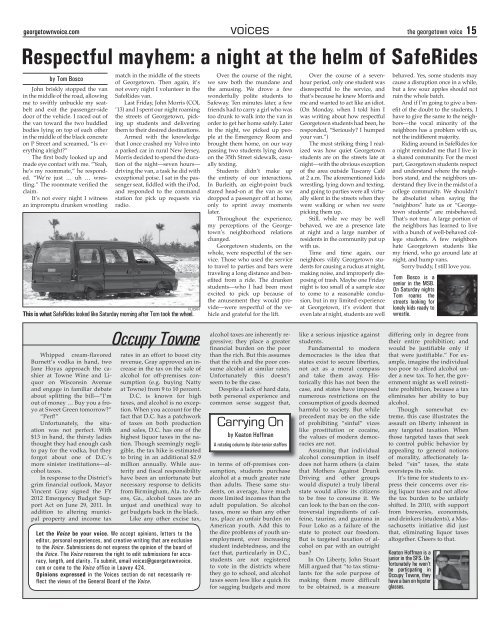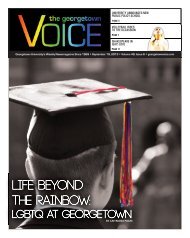November 17 - The Georgetown Voice
November 17 - The Georgetown Voice
November 17 - The Georgetown Voice
Create successful ePaper yourself
Turn your PDF publications into a flip-book with our unique Google optimized e-Paper software.
georgetownvoice.com<br />
John briskly stopped the van<br />
in the middle of the road, allowing<br />
me to swiftly unbuckle my seatbelt<br />
and exit the passenger-side<br />
door of the vehicle. I raced out of<br />
the van toward the two huddled<br />
bodies lying on top of each other<br />
in the middle of the black concrete<br />
on P Street and screamed, “Is everything<br />
alright?”<br />
<strong>The</strong> fi rst body looked up and<br />
made eye contact with me. “Yeah,<br />
he’s my roommate,” he responded.<br />
“We’re just … uh … wrestling.”<br />
<strong>The</strong> roommate verifi ed the<br />
claim.<br />
It’s not every night I witness<br />
an impromptu drunken wrestling<br />
match in the middle of the streets<br />
of <strong>Georgetown</strong>. <strong>The</strong>n again, it’s<br />
not every night I volunteer in the<br />
SafeRides van.<br />
Last Friday, John Morris (COL<br />
’13) and I spent our night roaming<br />
the streets of <strong>Georgetown</strong>, picking<br />
up students and delivering<br />
them to their desired destinations.<br />
Armed with the knowledge<br />
that I once crashed my Volvo into<br />
a parked car in rural New Jersey,<br />
Morris decided to spend the duration<br />
of the night—seven hours—<br />
driving the van, a task he did with<br />
exceptional poise. I sat in the passenger<br />
seat, fi ddled with the iPod,<br />
and responded to the command<br />
station for pick up requests via<br />
radio.<br />
voices the georgetown voice 15<br />
Respectful mayhem: a night at the helm of SafeRides<br />
by Tom Bosco<br />
FLICKR<br />
This is what SafeRides looked like Saturday morning after Tom took the wheel.<br />
Whipped cream-flavored<br />
Burnett’s vodka in hand, two<br />
Jane Hoyas approach the cashier<br />
at Towne Wine and Liquor<br />
on Wisconsin Avenue<br />
and engage in familiar debate<br />
about splitting the bill—“I’m<br />
out of money … Buy you a froyo<br />
at Sweet Green tomorrow?”<br />
“Perf!”<br />
Unfortunately, the situation<br />
was not perfect. With<br />
$13 in hand, the thirsty ladies<br />
thought they had enough cash<br />
to pay for the vodka, but they<br />
forgot about one of D.C.’s<br />
more sinister institutions—alcohol<br />
taxes.<br />
In response to the District’s<br />
grim financial outlook, Mayor<br />
Vincent Gray signed the FY<br />
2012 Emergency Budget Support<br />
Act on June 29, 2011. In<br />
addition to altering municipal<br />
property and income tax<br />
Occupy Towne<br />
rates in an effort to boost city<br />
revenue, Gray approved an increase<br />
in the tax on the sale of<br />
alcohol for off-premises consumption<br />
(e.g. buying Natty<br />
at Towne) from 9 to 10 percent.<br />
D.C. is known for high<br />
taxes, and alcohol is no exception.<br />
When you account for the<br />
fact that D.C. has a patchwork<br />
of taxes on both production<br />
and sales, D.C. has one of the<br />
highest liquor taxes in the nation.<br />
Though seemingly negligible,<br />
the tax hike is estimated<br />
to bring in an additional $2.9<br />
million annually. While austerity<br />
and fiscal responsibility<br />
have been an unfortunate but<br />
necessary response to deficits<br />
from Birmingham, Ala. to Athens,<br />
Ga., alcohol taxes are an<br />
unjust and unethical way to<br />
get budgets back in the black.<br />
Like any other excise tax,<br />
Let the <strong>Voice</strong> be your voice. We accept opinions, letters to the<br />
editor, personal experiences, and creative writing that are exclusive<br />
to the <strong>Voice</strong>. Submissions do not express the opinion of the board of<br />
the <strong>Voice</strong>. <strong>The</strong> <strong>Voice</strong> reserves the right to edit submissions for accuracy,<br />
length, and clarity. To submit, email voices@georgetownvoice.<br />
com or come to the <strong>Voice</strong> office in Leavey 424.<br />
Opinions expressed in the <strong>Voice</strong>s section do not necessarily reflect<br />
the views of the General Board of the <strong>Voice</strong>.<br />
Over the course of the night,<br />
we saw both the mundane and<br />
the amusing. We drove a few<br />
wonderfully polite students to<br />
Safeway. Ten minutes later, a few<br />
friends had to carry a girl who was<br />
too drunk to walk into the van in<br />
order to get her home safely. Later<br />
in the night, we picked up people<br />
at the Emergency Room and<br />
brought them home, on our way<br />
passing two students lying down<br />
on the 35th Street sidewalk, casually<br />
texting.<br />
Students didn’t make up<br />
the entirety of our interactions.<br />
In Burleith, an eight-point buck<br />
stared head-on at the van as we<br />
dropped a passenger off at home,<br />
only to sprint away moments<br />
later.<br />
Throughout the experience,<br />
my perceptions of the <strong>Georgetown</strong>’s<br />
neighborhood relations<br />
changed.<br />
<strong>Georgetown</strong> students, on the<br />
whole, were respectful of the service.<br />
Those who used the service<br />
to travel to parties and bars were<br />
traveling a long distance and benefi<br />
ted from a ride. <strong>The</strong> drunken<br />
students—who I had been most<br />
excited to pick up because of<br />
the amusement they would provide—were<br />
respectful of the vehicle<br />
and grateful for the lift.<br />
alcohol taxes are inherently regressive;<br />
they place a greater<br />
financial burden on the poor<br />
than the rich. But this assumes<br />
that the rich and the poor consume<br />
alcohol at similar rates.<br />
Unfortunately this doesn’t<br />
seem to be the case.<br />
Despite a lack of hard data,<br />
both personal experience and<br />
common sense suggest that,<br />
Carrying On<br />
by Keaton Hoffman<br />
A rotating column by <strong>Voice</strong> senior staffers<br />
in terms of off-premises consumption,<br />
students purchase<br />
alcohol at a much greater rate<br />
than adults. <strong>The</strong>se same students,<br />
on average, have much<br />
more limited incomes than the<br />
adult population. So alcohol<br />
taxes, more so than any other<br />
tax, place an unfair burden on<br />
American youth. Add this to<br />
the dire problems of youth unemployment,<br />
ever increasing<br />
student indebtedness, and the<br />
fact that, particularly in D.C.,<br />
students are not registered<br />
to vote in the districts where<br />
they go to school, and alcohol<br />
taxes seem less like a quick fix<br />
for sagging budgets and more<br />
Over the course of a sevenhour<br />
period, only one student was<br />
disrespectful to the service, and<br />
that’s because he knew Morris and<br />
me and wanted to act like an idiot.<br />
(On Monday, when I told him I<br />
was writing about how respectful<br />
<strong>Georgetown</strong> students had been, he<br />
responded, “Seriously? I humped<br />
your van.”)<br />
<strong>The</strong> most striking thing I realized<br />
was how quiet <strong>Georgetown</strong><br />
students are on the streets late at<br />
night—with the obvious exception<br />
of the area outside Tuscany Café<br />
at 2 a.m. <strong>The</strong> aforementioned kids<br />
wrestling, lying down and texting,<br />
and going to parties were all virtually<br />
silent in the streets when they<br />
were walking or when we were<br />
picking them up.<br />
Still, while we may be well<br />
behaved, we are a presence late<br />
at night and a large number of<br />
residents in the community put up<br />
with us.<br />
Time and time again, our<br />
neighbors vilify <strong>Georgetown</strong> students<br />
for causing a ruckus at night,<br />
making noise, and improperly disposing<br />
of trash. Maybe one Friday<br />
night is too small of a sample size<br />
to come to a reasonable conclusion,<br />
but in my limited experience<br />
at <strong>Georgetown</strong>, it’s evident that<br />
even late at night, students are well<br />
like a serious injustice against<br />
students.<br />
Fundamental to modern<br />
democracies is the idea that<br />
states exist to secure liberties,<br />
not act as a moral compass<br />
and take them away. Historically<br />
this has not been the<br />
case, and states have imposed<br />
numerous restrictions on the<br />
consumption of goods deemed<br />
harmful to society. But while<br />
precedent may be on the side<br />
of prohibiting “sinful” vices<br />
like prostitution or cocaine,<br />
the values of modern democracies<br />
are not.<br />
Assuming that individual<br />
alcohol consumption in itself<br />
does not harm others (a claim<br />
that Mothers Against Drunk<br />
Driving and other groups<br />
would dispute) a truly liberal<br />
state would allow its citizens<br />
to be free to consume it. We<br />
can look to the ban on the controversial<br />
ingredients of caffeine,<br />
taurine, and guarana in<br />
Four Loko as a failure of the<br />
state to protect our freedom.<br />
But is targeted taxation of alcohol<br />
on par with an outright<br />
ban?<br />
In On Liberty, John Stuart<br />
Mill argued that “to tax stimulants<br />
for the sole purpose of<br />
making them more difficult<br />
to be obtained, is a measure<br />
behaved. Yes, some students may<br />
cause a disruption once in a while,<br />
but a few sour apples should not<br />
ruin the whole batch.<br />
And if I’m going to give a benefi<br />
t of the doubt to the students, I<br />
have to give the same to the neighbors—the<br />
vocal minority of the<br />
neighbors has a problem with us,<br />
not the indifferent majority.<br />
Riding around in SafeRides for<br />
a night reminded me that I live in<br />
a shared community. For the most<br />
part, <strong>Georgetown</strong> students respect<br />
and understand where the neighbors<br />
stand, and the neighbors understand<br />
they live in the midst of a<br />
college community. We shouldn’t<br />
be absolutist when saying the<br />
“neighbors” hate us or “<strong>Georgetown</strong><br />
students” are misbehaved.<br />
That’s not true. A large portion of<br />
the neighbors has learned to live<br />
with a bunch of well-behaved college<br />
students. A few neighbors<br />
hate <strong>Georgetown</strong> students like<br />
my friend, who go around late at<br />
night, and hump vans.<br />
Sorry buddy, I still love you.<br />
Tom Bosco is a<br />
senior in the MSB.<br />
On Saturday nights<br />
Tom roams the<br />
streets looking for<br />
lonely kids ready to<br />
wrestle.<br />
differing only in degree from<br />
their entire prohibition; and<br />
would be justifiable only if<br />
that were justifiable.” For example,<br />
imagine the individual<br />
too poor to afford alcohol under<br />
a new tax. To her, the government<br />
might as well reinstitute<br />
prohibition, because a tax<br />
eliminates her ability to buy<br />
alcohol.<br />
Though somewhat extreme,<br />
this case illustrates the<br />
assault on liberty inherent in<br />
any targeted taxation. When<br />
those targeted taxes that seek<br />
to control public behavior by<br />
appealing to general notions<br />
of morality, affectionately labeled<br />
“sin” taxes, the state<br />
oversteps its role.<br />
It’s time for students to express<br />
their concerns over rising<br />
liquor taxes and not allow<br />
the tax burden to be unfairly<br />
shifted. In 2010, with support<br />
from breweries, economists,<br />
and drinkers (students), a Massachusetts<br />
initiative did just<br />
that, eliminating liquor taxes<br />
altogether. Cheers to that.<br />
Keaton Hoffman is a<br />
junior in the SFS. Unfortunately<br />
he won’t<br />
be particpating in<br />
Occupy Towne, they<br />
have a ban on hipster<br />
glasses.



